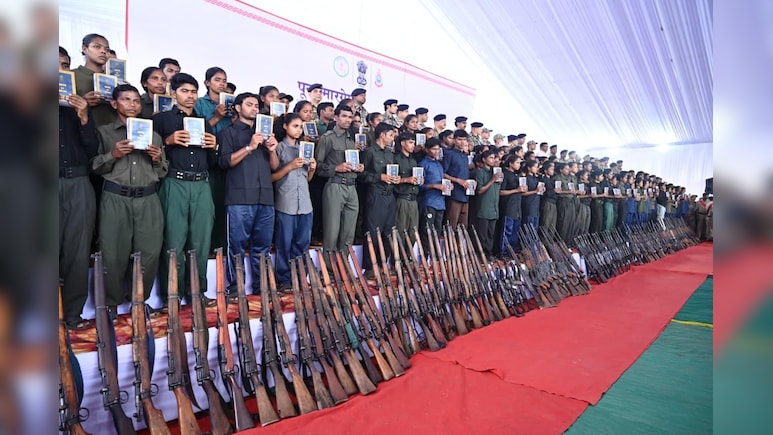
In one of the most dramatic turns in India's decades-long Maoist insurgency, two senior Maoist Central Committee members, Rupesh alias T Vasudev Rao and Sonu alias Bhupati, have surrendered, triggering panic and deep mistrust within the Maoist organisation. The Central Committee has branded both "traitors," and the security forces are calling it the biggest breakthrough in the Bastar region in years.
Rupesh, who carried a bounty of Rs 1 crore, surrendered in Bastar alongside hundreds of cadres on October 17, while Bhupati and 60 of his men surrendered earlier in Maharashtra. In Jagdalpur, a total of 210 Maoists laid down their arms before the police, handing over 153 weapons in an extraordinary mass surrender. Three buses full of Maoist cadres arrived at the police headquarters under tight security, marking what officials are calling a "historic shift in the Red Corridor."
The shock within the radical left hierarchy was immediate. Abhay, spokesperson of the organisation's Central Committee, released a strongly worded pamphlet condemning both Rupesh and Bhupati as "traitors who betrayed the revolution". The letter accused Rupesh of secretly maintaining contact with government officials and police officers for months before his surrender.
Within 48 hours, Rupesh responded with a video message. In the video, the once-feared Maoist commander declared that his decision was not an act of betrayal but part of a larger peace plan initiated by none other than general secretary Basavaraju, who was killed in an encounter earlier this year. "This was not just my decision," Rupesh said in the video. "Basavaraju himself wanted to end the armed struggle and explore peace talks with the government. He had even written to the leadership about this before he was killed. We wanted to save our people and our party. There was no other way."
Rupesh revealed that discussions on peace had already begun at the highest levels of the Maoist command. "We had planned to bring the matter to the core committee. The government insisted that we first give up our arms. We were preparing to do that when Basavaraju was killed," he said, adding that he had personally written to another top leader, Devji, regarding the peace dialogue.
He firmly rejected the Central Committee's allegations of betrayal. "We have not done anything that deserves blame. None of us harmed our comrades. We only want those still inside to come out and see the truth. No one was forced to surrender; it was a decision of conscience."
Officials say the timing of the surrender could not have been worse for the Maoist command, which has been losing ground steadily across Chhattisgarh, Maharashtra, and Odisha. The simultaneous surrender of two senior Central Committee members is being seen as a psychological and organisational collapse for the Maoists.
According to official data, since January 2024, over 2,100 rebels have surrendered, 477 have been killed in encounters, and 1,785 have been arrested in coordinated operations. Security agencies believe that this chain of surrenders, combined with growing fatigue within the cadre, is a direct result of long-term counter-insurgency pressure and dwindling support in the forest zones.
The surrender of Rupesh and Bhupati has not only weakened the Maoist organization's top leadership structure but also exposed internal divisions. For decades, the Maoist movement has projected unity in ideology and command. But with Basavaraju's death and two of his senior lieutenants choosing peace over violence, the Red Corridor is showing its deepest cracks yet.
For the first time, a top Maoist leader has publicly acknowledged that their own General Secretary wanted an end to the armed struggle -- a revelation that may mark the beginning of the end of India's longest-running internal insurgency.
Track Latest News Live on NDTV.com and get news updates from India and around the world

